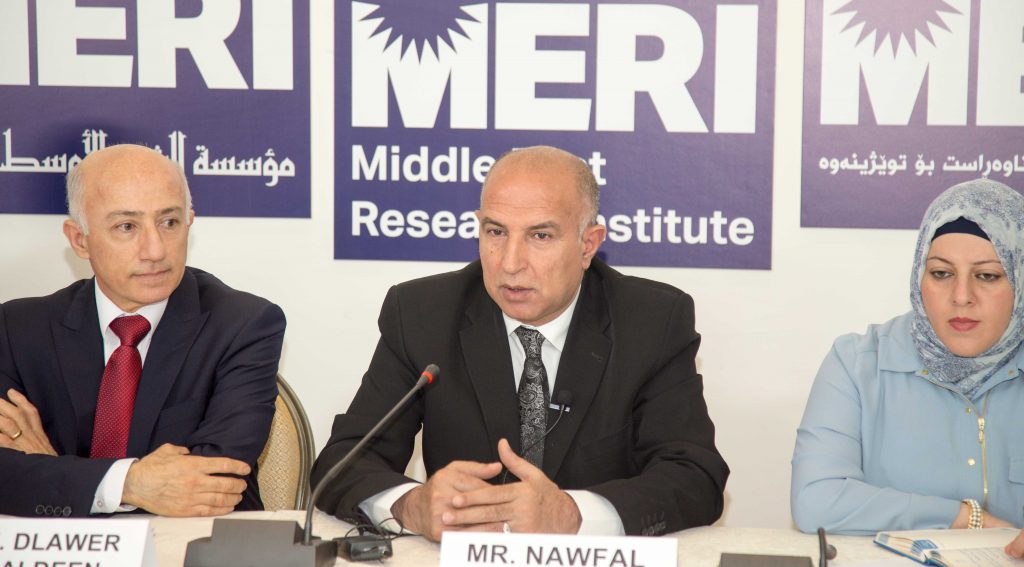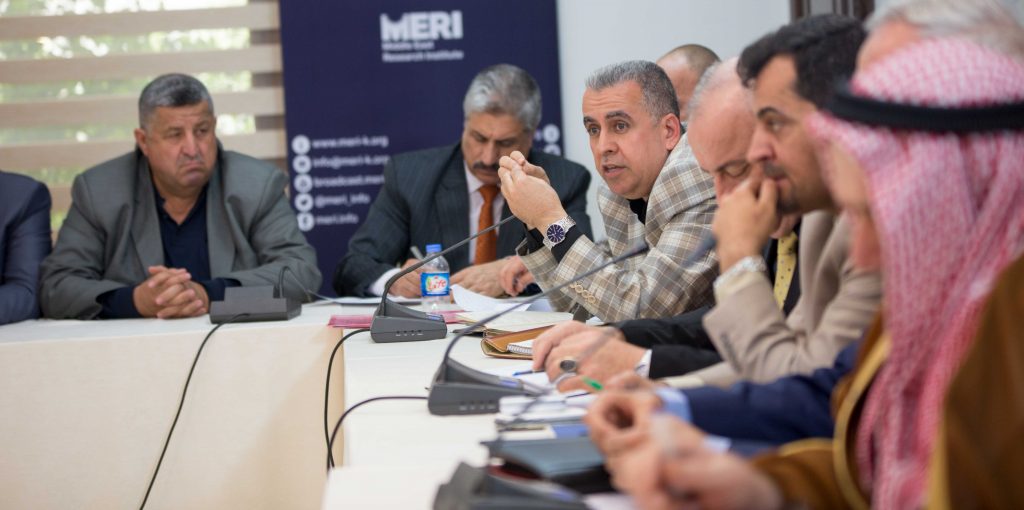“We are already living in the post-Islamic State (IS) stage. Nineveh’s local government has been working on recovery, and progress is evident in terms of stability, reconstruction and provision of essential services in liberated districts, starting with Qayyarah, Shoura, Hamam Al-Alil, Hamdaniya, Basheeqa, Bartila as well as the left side of Mosul city” stated Nineveh Governor, Nofal Hammadi, during a roundtable organised by the Middle East Research Institute (MERI) on 18 April 2017.
The event was attended by local leaders from Nineveh Province, Nineveh Provincial Council, mayors of the various districts, representatives from the Kurdistan regional government, minority groups and the private sector (see below for a full list of attendants). The event was aimed at engaging local leaders and other stakeholders in designing a roadmap for the future reconstruction and recovery of Nineveh.

The participants shared their visions of the recovery process of Nineveh and highlighted recent milestones achieved within the liberated areas, particularly in relation to security provision, infrastructure repair, the reconciliation process and the return of internally displaced people.
Among the currently approved plans is the ‘Nineveh five year strategy’, supported by the Nineveh local government, which is intended to be executed over three stages in the next few years. “Work is ongoing during the day and night to provide basic services, such as water and power, in the liberated areas as well as to clear the destruction caused by IS”, explained Hammadi. In addition, this stage necessitates a “more thorough and deeper understanding”, according to Al-Kiki, Chairman for the Nineveh Provincial Council, who called “all components of Nineveh to cooperate and participate in serious dialogue to further the recovery process”.
ankara escort
çankaya escort
ankara escort
çankaya escort
escort ankara
çankaya escort
escort bayan çankaya
istanbul rus escort
eryaman escort
escort bayan ankara
ankara escort
kızılay escort
istanbul escort
ankara escort
ankara rus escort
escort çankaya
ankara escort bayan
istanbul rus Escort
atasehir Escort
beylikduzu Escort

A range of practical recommendations were put forward for stakeholders and decision makers at the local and national government level, as well as the Kurdistan regional government. Rebuilding trust between citizens and authorities and between Erbil and Baghdad was considered crucial for the success of the Nineveh recovery process. The importance of the private sector and private investment were also stressed for the reconstruction and ultimate recovery of Nineveh.
The first half of the event was live streamed (click here for the video) and speakers included:
- Nofal Hammadi Al-Sultan, Nineveh Governor
- Bashar Al-Kiki, Chairman of Nineveh Provincial Council
- Jabar Yawar, Secretary General of the Ministry of Peshmerga Affairs
- Aseen Hamza Khalil, Head of the Reconstruction and Services Committee
- Sail Ismael Alomary, Governor’s Assistant for Planning
- Khalid Kaheel Mohammad, Dean of College of Engineering at Nineveh University
- Yunis Shareef Dawood, Director of Engineering Affairs
- Anees Bahnam Na’oom, Administrative Assistant at Alhamdaniya University
- Abdulmawjood Elyas, Director of Engineering at Alhamdaniya University
- Dawood Baba Ya’qoob, Member of Nineveh Provincial Council
- Abdulqadir Abdullah Alsinjary, First Deputy of Nineveh Governor
- Abdulkareem Mohammad Hasan, Head of Nineveh Investment Commission
- Basim Ya’qoob Blo, Chief of Takleef district
- Imad Alrashidy, Advisor to Nineveh Governor for Security Affairs
- Norradin Yunis Qiblan, Chairman Deputy of Nineveh Provincial Council
- Aweed Ali Aljiheshi, Member of Nineveh Provincial Council
- Ameen Ibrahim Alhanash, Nineveh Governor’s Assistant
- Mohammad Mwazi Almakram, Advisor to Nineveh Governor
- Qusai Hajim Mohammad Al’asaf, Nineveh Governor’s Assistant for Reconstruction
- Ali Mohammad Ali, Iraqi Businessmen Union
- Hathal Yunis Aga, Investor at Nineveh Business Centre
- Abdulkareem Ali Fathil, Administrative Assistant of Nineveh Governor
- Khudaida Qolo Ali, Advisor to Nineveh Governor for Yazidi component
- Ikhlas Sabah Khithr, Head of Nineveh Women Network
- Hasan Alsab’awi, Member of Nineveh Provincial Council
- Abdulbazi Mahmood, Assistant of Nineveh Governor for Power Affairs
- Mohammad Ali Hazim Almashhadani, Chairman of Nineveh Industry Chamber
- Yaqthan Zuhair Alsafar, private sector
- Mohammad Yaseen Majeed, private sector
* * * * *
About MERI: The Middle East Research Institute is Iraq’s leading policy-research institute and think tank. It is an independent, entirely grant-funded not-for-profit organisation, based in Erbil, Kurdistan Region. Its mission is to contribute to the process of nation-building, state-building and democratisation via engagement, research, analysis and policy debates.
MERI’s main objectives include promoting and developing human rights, good governance, the rule of law and social and economic prosperity. MERI conduct high impact, high quality research (including purpose-based field work) and has published extensively in areas of: human rights, government reform, international politics, national security, ISIS, refugees, IDPs, minority rights (Christians, Yezidis, Turkmen, Shabaks, Sabi mandeans), Baghdad-Erbil relations, Hashd Al-Shabi, Peshmarga, violence against women, civil society. MERI engages policy- and decision-makers, the civil society and general public via publication, focused group discussions and conferences (MERI Forum).

